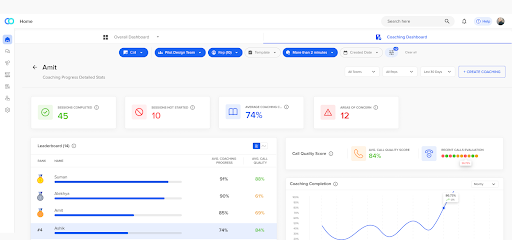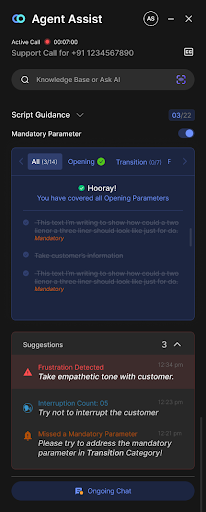In the competitive landscape of the airline industry, exceptional customer service is not just a luxury but a necessity. Airlines that prioritize and excel in customer service set themselves apart by creating memorable and positive passenger experiences.
These principles are the foundation for building trust, enhancing passenger satisfaction, and fostering loyalty in a highly dynamic environment. Understanding and implementing these principles can transform routine travel into an extraordinary journey, ensuring passengers feel valued and cared for at every step.
Track every passenger call with Convin insights.
What is Customer Service in Aviation and Why Is it Important in Airlines?
What is customer service in aviation? It’s the entire journey, right from booking and check-in to in-flight care and post-flight support. When done right, customer service makes passengers feel heard, valued, and supported at every step.
This proactive approach helps airlines handle issues quickly, enhance comfort mid-air, and resolve concerns even after landing.
Eliminate missed service escalations with Convin!
What Are the 5 Principles That Define What Is Customer Service in Aviation?

The airline industry's customer service principles are foundational to a seamless passenger experience.
Principle 1: Consistent Communication
Clear and timely communication is essential in the airline industry. Passengers rely on accurate information about flight schedules, delays, cancellations, and other essential updates. Consistent communication helps manage passenger expectations and reduce anxiety, especially during disruptions.
Importance of Clear and Timely Communication
- Customer Service Characteristics: Effective communication is characterized by clarity, accuracy, and promptness. Airlines should ensure that all communication channels, including emails, SMS, and app notifications, are utilized effectively to keep passengers informed.
- Elements of Customer Service: Communication is a critical element of customer service. It involves providing accurate information, addressing passenger queries promptly, and ensuring transparency in all interactions.
Airline Customer Service Examples
1. Delta Air Lines: Delta is known for its proactive communication strategy. It provides real-time updates via its mobile app, SMS, and email. Delta’s customer service team actively contacts affected passengers during disruptions to offer assistance and alternative solutions.
2. Singapore Airlines: Singapore Airlines excels in personalized communication. It uses passenger data to offer tailored travel recommendations and updates. Its in-flight staff is trained to communicate effectively, ensuring that passengers are well-informed.
Interactive Voice Response (IVR) systems are crucial in airline customer service. They help manage high call volumes efficiently by providing automated responses to common queries. This ensures that passengers receive timely information without waiting for a human agent.
Types of Customer Service in Airlines
1. Pre-flight Services include booking assistance, baggage inquiries, and check-in support. Airlines offer these services through websites, mobile apps, and customer service centers.
2. In-flight Services: Customer service encompasses everything from passenger comfort to addressing specific needs during the flight. Cabin crew are trained to handle various situations, ensuring a pleasant travel experience.
3. Post-flight Services: After the journey, airlines provide support for lost baggage claims, feedback processing, and any follow-up inquiries. Effective post-flight service reinforces passenger satisfaction and loyalty.
Principle 2: Personalization
Personalization is key to exceptional customer service in airlines. Customizing experiences for different customers can significantly enhance satisfaction and loyalty. Airlines can create a more enjoyable and memorable travel experience by understanding and addressing individual needs and preferences.
- Customer Service Characteristics: Personalization involves recognizing unique customer preferences and providing tailored services. This can include customized meal options, seat preferences, and personalized communication.
- Elements of Customer Service: Personalization is a crucial element of customer service. It requires collecting and analyzing passenger data to offer customized services that enhance the travel experience.
Airline Customer Service Examples
- Emirates: Emirates offers a highly personalized travel experience. From tailored in-flight entertainment options to personalized greetings, Emirates ensures that each passenger feels unique and valued.
Virgin Atlantic: Virgin Atlantic uses passenger data to offer personalized services such as customized meal options and targeted offers. Their customer service team is trained to anticipate and address individual passenger needs.Airlines can enhance personalization by linking customer service numbers to CRM systems. This allows representatives to access passenger profiles and provide customized assistance based on their travel history and preferences.
Principle 3: Proactive Problem Solving
Proactive problem-solving is essential in preventing minor issues from becoming significant disruptions. Airlines must promptly anticipate and address potential problems to ensure a smooth passenger experience.
- Customer Service Characteristics: Proactive problem-solving involves being attentive, responsive, and forward-thinking. This includes monitoring flights for potential delays, checking in with passengers, and offering solutions before issues escalate.
- Elements of Customer Service: Key elements include real-time monitoring, timely intervention, and effective resolution strategies. Airlines should employ staff trained to handle unexpected situations efficiently and with empathy.
Types of Customer Service in Airlines
- Proactive Notifications: Airlines can send proactive notifications about flight status, gate changes, and other essential updates. This helps passengers plan accordingly and reduces stress.
- On-the-Spot Problem Solving: The cabin crew and ground staff should be empowered to resolve issues immediately. Whether rebooking a flight or addressing a passenger's concern, timely solutions are crucial.
- Customer Feedback Loops: Collecting and analyzing passenger feedback helps airlines identify recurring issues and implement preventative measures.

Principle 4: Empathy and Understanding
Empathy is a powerful tool in customer service. Understanding and addressing passengers' emotions and concerns can significantly enhance satisfaction and loyalty.
- Customer Service Characteristics: Empathy statements involve active listening, understanding passenger emotions, and responding with kindness and patience. It's about making passengers feel heard and valued.
- Elements of Customer Service: Empathy should be integrated into all customer interactions, from booking agents to cabin crew. Training staff to handle stressful situations with compassion is essential.
Airline Customer Service Examples
- Southwest Airlines: Southwest is renowned for its empathetic customer service. Their staff are trained to handle passenger concerns with care and understanding, often going above and beyond to ensure satisfaction.
- JetBlue: JetBlue emphasizes empathy in its customer service training, ensuring that all interactions are handled with patience and a genuine desire to help.
Principle 5: Efficient Use of Technology
Technology is crucial in modernizing and improving customer service. Interactive Voice Response (IVR) systems and other technologies can streamline processes and enhance the passenger experience.
- IVR Customer Service: IVR systems help manage high call volumes by providing automated responses to common queries. Advanced IVR systems can also route calls to the appropriate department, ensuring that passengers receive the help they need quickly.
- Customer Service Solutions: AI-powered chatbots, mobile apps, and CRM systems are examples of technologies that improve customer service. These tools help manage passenger data, provide real-time updates, and offer personalized assistance.
Airline Customer Service Examples
- Delta Air Lines: Delta uses advanced CRM systems to manage passenger data and provide personalized service. Their mobile app offers real-time updates, baggage tracking, and easy access to customer support.
- Lufthansa: Lufthansa’s AI-powered chatbot, “Mildred,” helps passengers find the best flight options and answers common queries, enhancing the overall customer experience.
Customer Service Terms
- Customer Service Aviation Salary: The demand for tech-savvy customer service representatives has increased with the integration of advanced technologies. Salaries for such roles are often higher, reflecting the specialized skills required.
- Customer Service Solutions: Effective use of technology in customer service includes deploying CRM systems, AI chatbots, and mobile applications to enhance service delivery.
Convin surfaces insights your dashboards don’t!
This blog is just the start.
Unlock the power of Convin’s AI with a live demo.

How Does Convin Improve Customer Service in Aviation?
Discover how Convin is revolutionizing airline customer service with its AI-driven solutions. Convin enhances the passenger experience by leveraging advanced conversation intelligence, ensuring seamless and efficient interactions.

1. Automated Quality Management in Airlines
Convin's Automated Quality Management (Auto QA) is a game-changer for the airline industry. It automatically reviews 100% of customer interactions across all channels, ensuring consistent and thorough quality checks.
This tool helps airlines identify performance blockers and unhappy customer interactions in real-time, enabling swift corrective actions.
By generating call scores through custom auditing templates, airlines can pinpoint coaching needs and areas for improvement, leading to enhanced service quality and higher passenger satisfaction.

2. Personalized Training for Airline Customer Service Agents
Convin's Auto Coaching feature uses AI-driven insights to provide personalized training for customer service agents. By reviewing agent performance and identifying coaching opportunities, Convin ensures that training is tailored to each agent's needs.
This method extracts best practices from top-performing agents' conversations and creates coaching modules for others.
In the airline industry, this leads to improved call handling, reduced supervisor escalations, and a more competent and confident customer service team.

3. Convin Insights for Better Decision-Making
Convin Insights leverages conversation intelligence to provide airlines with actionable data and reports. Convin highlights key performance indicators (KPIs) and customer experience metrics by recording, transcribing, and analyzing customer interactions.
Airlines can use these insights to identify trends, understand passenger sentiments, and make data-driven decisions to enhance service quality.
Convin's reports help airlines proactively address issues, optimize operations, and improve overall passenger satisfaction.

4. Real-Time Guidance for Enhanced Passenger Support
Convin's Real-Time Agent Assist (RT Agent Assist) is designed to empower airline customer service agents during live interactions. Leveraging natural language processing and machine learning, RT Agent Assist provides instant suggestions, prompts, and warnings during calls, chats, and emails.
This real-time support helps agents navigate complex scenarios, adhere to compliance requirements, and maintain high service standards.
For airlines, RT Agent Assist ensures that passengers receive timely and accurate information, leading to a smoother and more satisfying travel experience.
Spot top-performing agents faster using Convin!
How Do AI-Driven Solutions Elevate Customer Service in Aviation?

Convin, an AI-backed contact center software, can significantly enhance airline customer service by offering advanced solutions for communication, personalization, proactive problem-solving, and technology integration.
Convin’s automated quality management ensures that every customer interaction is reviewed and optimized for better service delivery. Real-time guidance and personalized coaching improve agent performance, enabling them to handle passenger inquiries empathetically and efficiently.
Convin's AI-driven tools, such as IVR systems and chatbots, streamline communication and provide passengers with timely, accurate information, reducing wait times and enhancing satisfaction.
Additionally, Convin's proactive problem-solving capabilities help airlines anticipate and address issues before they escalate, ensuring passengers' seamless and stress-free travel experience.
Improve NPS in aviation with Convin’s help!
What Are the Key Principles and Innovations Behind Customer Service in Aviation?
Customer service is the backbone of the airline industry, directly influencing passenger satisfaction and loyalty. By adhering to fundamental principles such as clear and consistent communication, personalization, proactive problem-solving, empathy, and efficient use of technology, airlines can significantly enhance their customer service experience.
Effective communication keeps passengers informed, personalization creates memorable journeys, proactive problem-solving prevents issues from escalating, empathy fosters trust and loyalty, and advanced technologies streamline service delivery.
Companies like Convin offer innovative solutions to help airlines achieve these goals, ensuring high customer satisfaction and operational efficiency.
Book your Convin demo today!
FAQs
- What are the 5 principles of customer service?
1. Empathy: Understand and share the feelings of the customer.
2. Responsiveness: Promptly addressing customer needs and inquiries.
3. Reliability: Consistently providing dependable service.
4. Assurance: Building customer trust through knowledge and courtesy.
5. Tangibles: Presenting a professional and appealing physical presence.
- What are the 5 main elements of customer service?
1. Communication: Clear and effective interaction with customers.
2. Patience: Remaining calm and understanding, especially with difficult customers.
3. Attentiveness: Listening to and understanding customer needs.
4. Product Knowledge: Being well-informed about the products or services offered.
5. Problem-Solving Skills: Efficiently resolving customer issues.
- What are the 5 R's of customer service?
1. Responsibility: Taking ownership of customer issues.
2. Resolution: Providing practical solutions to problems.
3. Respect: Treating customers with dignity and consideration.
4. Responsiveness: Reacting quickly to customer requests and feedback.
5. Reassurance: Giving customers confidence in the service provided.
- What is the rule of 5 in customer service?
The rule of 5 in customer service refers to the principle that one negative experience typically requires five positive interactions to counterbalance and restore customer satisfaction. This highlights the importance of consistently delivering excellent service.




.webp)



.avif)